Royal Dutch Shell Court Order Shifts Paradigm for Corporate ESG Accountability
On 26 May 2021, the Court of The Hague orders Royal Dutch Shell (RDS) to reduce CO2 emissions to a net 45% by the end of 2030 compared to 2019 through the Group Policy of the Shell Group. The order of a national (Dutch) court demands that a global company (RDS) fulfills its obligations under the Paris Climate Agreement, although RDS was not a party in that agreement, and there is no legal equivalent in The Netherlands. What are the broader consequences of this order, also globally and for other companies and potentially also other jurisdictions?
Les points communs entre la réglementation française et européenne en matière d’ISR
Quand les nouvelles réglementations sur les investissements durables et responsables (ISR) furent annoncées avec le « EU Action Plan », les institutionnels français n'ont pas cillé. Depuis l'accord de Paris en 2015, de nombreuses nouvelles obligations réglementaires liées à la publication d’information et à l’analyse ESG ont influencé les stratégies d’investissements responsables des institutionnels français. Le règlement SFDR qui est entré en vigueur le 10 mars dernier vient s’ajouter au cadre réglementaire local en matière de reporting.
Unwritten Risks – The True Costs of Mispriced Climate Change
Research shows that Property & Casualty insurance underwriters are not accurately pricing climate risks, and US government policy and program decisions are proving to be unsustainable. In our most recent blog, Justin Cheng talks about the resulting premium pricing corrections in the wake of intensifying extreme weather events. With this trend, a significant number of US homeowners are unable to obtain property insurance while taxpayers take on the increased cost of climate risk.
Is there a price to be paid for ESG Investing?
With a growing awareness around sustainability issues and accelerating regulatory developments in Europe, sustainable finance is one of the most significant talking points of our time. But what does sustainability investing mean for stakeholders and what are the resulting challenges? What’s more, what kind of impact does this have on a company’s mid to long-term strategy as well as its short-term profitability? By bringing together representatives from the regulatory side, the financial industry, the non-financial industry and an independent advisory firm, we aim to take a closer look at the consequences for the corporate world and answer a key question - is there a price to be paid for investing in ESG companies?
2020 Material Risk Engagement Annual Report
Material Risk Engagement helps investors promote and protect their long-term value by engaging with high-risk companies on their financially material ESG issues. This inaugural Material Risk Engagement annual report covers ten months since its launch in March 2020. Read the report to learn more about:
Bringing Investors and Companies Together to Address the Climate Change Crisis
As Earth Day is around the corner on the 22nd of April, the Biden Administration is to convene a global climate summit. Following a historical precedent for several such events, since its inception in 1970, including signing the landmark Paris Agreement . We have seen positive developments since the Paris Agreement; societal actions to address some of the root causes of climate change have yet to suppress the negative trends . Historically, active ownership on climate change has focused on direct emissions from highly exposed sectors, such as fossil fuel and utility companies. However, the more complicated, less direct aspects of climate change have seen limited progress. Tackling such issues will see a strong need for collaboration from both countries and other key sectors, in particular, banking and finance. Banks are key to support this transformation; facilitating economic activity for positive change throughout the entire value chain is key.
UNICEF Collaborates with Sustainalytics to Highlight Children’s Rights Issues for Investors
While child labor remains a serious problem across industries and countries, it is only one part of the overall issues pertaining to children’s rights; companies and investors should recognize the scope and relevance of this topic.
Personal Products and the New Ethics of Product Naming
Over recent years, personal product (PP) companies have faced an increasing demand for more inclusive product governance – from formulations to labels – and marketing that reflects the diversity of consumers. To grow sustainably within their communities and stay relevant for their target customers, such companies need to create value for society proactively. Some of the major players in this industry have already started paving the way for others.
Investing in Companies with Positive Momentum in ESG Risk and Economic Moat Development
In Sustainalytics’ paper, Combining ESG Risk and Economic Moat,[i] we examined the effect of combining the two metrics, showcasing the benefits of higher returns and lower downside risk. More specifically, investing in companies with negligible/low ESG risk and wide economic moats was advantageous for creating alpha over the past four years.
Water Security: Global Challenge, Local Solutions
The growing scarcity of freshwater resources is a risk to the economic, social, and environmental well-being of populations worldwide, and a material issue for companies. Corporate-wide water strategies are essential, but because water security challenges are experienced at the local level, and water basin conditions are unique, there is no one-size-fits-all solution for companies to implement.
Deepwater Plays Against Rising Risks: The U.S. Gulf of Mexico
As onshore resources became harder to locate over the past decades, offshore exploration and production have grown into a global industrial activity. The prospect of finding hydrocarbons has led some companies to explore deeper waters in some regions.
Applications of Country Risk Ratings in Fixed Income Investing
How are Country Risk Ratings being utilized to identify risk and to construct a sovereign ESG fixed income index? Listen in as Manna Neghassi, Manager, Product Strategy and Development at Sustainalytics and Katie Binns, Senior Product Manager, Fixed Income Indexes at Morningstar Indexes tell us more.
Is the COVID-19 Pandemic Threatening Progress on Gender Equity?
The COVID-19 pandemic has disrupted lives and livelihoods on an unprecedented scale. Despite massive government spending, the pandemic resulted in the global economy shrinking by 3.5% in 2020.[i] However, the financial burden of this pandemic has not been borne evenly.
Enhancing Risk-Return Profile by Combining ESG Risk and Economic Moats
Hear from Sustainalytics' Methodology and Portfolio Research specialist, Liam Zerter, as he talks us through the key findings from Sustainalytics' recent Combining ESG Risk and Economic Moat report, which shows that economic moat and ESG risk can be combined to create investment strategies that generate value both in terms of returns and portfolio risks.




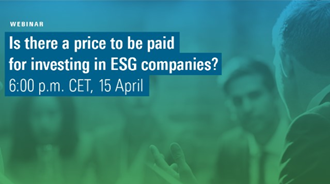
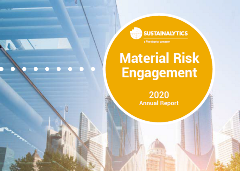




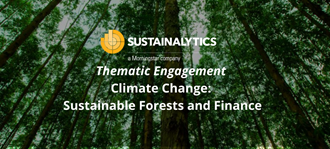




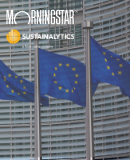

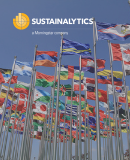

.tmb-thumbnl_rc.png?Culture=en&sfvrsn=881ecd4b_2)

